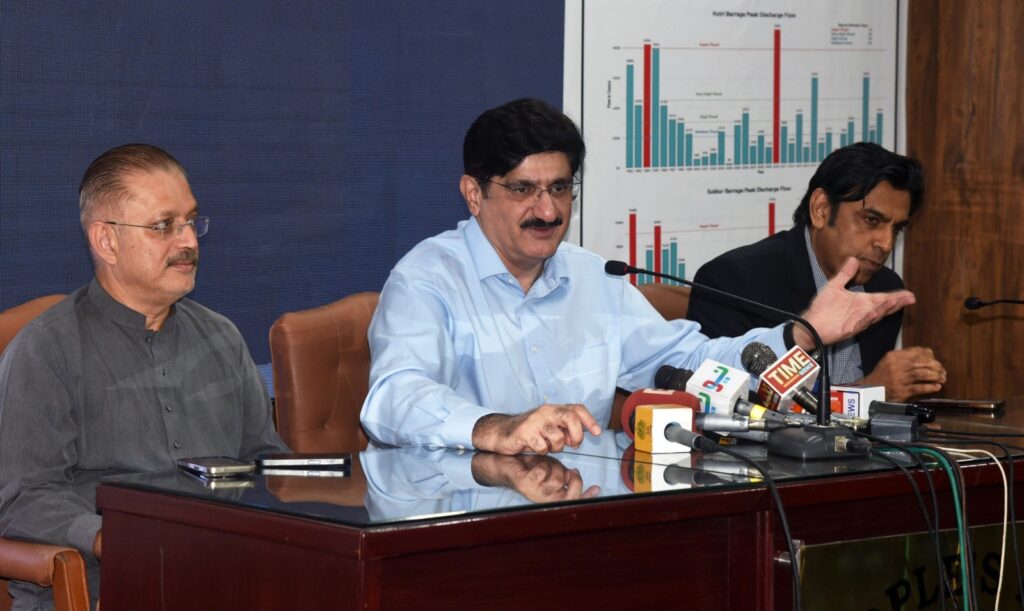Staff Reporter

Karachi: Sindh Chief Minister Syed Murad Ali Shah has warned of a possible super flood in Sindh after India released massive flows into the Chenab River and called on the federal government to devise a comprehensive climate change policy, stressing that Pakistan must be better prepared to handle recurring natural disasters.
Speaking at a press conference at the New Sindh Secretariat, flanked by Senior Minister Sharjeel Inam Memon and Chief Secretary Asif Hyder Shah, the CM revealed that “four days ago, 1.077 million cusecs of water had reached Qadirabad Barrage.” He explained that flows from the Jhelum, Chenab, Ravi, and Sutlej rivers converge at Panjnad before merging into the Indus at Kot Mithan. Currently, 250,000 cusecs from Ravi, 350,000 cusecs from Sutlej, and 200,000 cusecs from the Indus are joining Chenab flows, eventually draining into the sea through the Indus.
The NDMA has forecast flows of 800,000 to 1.1 million cusecs at Guddu Barrage around September 5, with Shah warning that “anything above 900,000 cusecs is declared a super flood.”
Murad Shah assured that Sindh was fully prepared to meet the challenge. “Our foremost responsibility is to protect human lives, livestock, and our barrages,” he said, adding that embankments were significantly raised after the 2010 floods and are now fortified. Sensitive points, including KK Bund, have been secured with machinery and watch camps, with round-the-clock monitoring by 16-member teams.


He recalled that during the 2010 super flood, Guddu Barrage witnessed 1.148 million cusecs, while 550,000 cusecs passed safely just last week. “Today, we are prepared for up to 910,000 cusecs,” he said. The CM said commissioners, deputy commissioners, and the PDMA have been directed to remain on high alert, villagers have been briefed, and the Health Department mobilized.
Turning to climate change, Shah stressed that Pakistan urgently needs a comprehensive national policy. “We must acknowledge that the impacts of climate change are extremely dangerous,” he said. He expressed solidarity with Punjab, which has been the hardest hit by current floods, unlike 2022 when Sindh and Balochistan bore the brunt.
The CM highlighted the institutional legacy of disaster management, recalling that after the 1973 and 1976 floods, Shaheed Zulfikar Ali Bhutto established the Federal Flood Commission, and now NDMA and PDMA are working actively. He also assigned provincial ministers Muhammad Ali Malkani and Riaz Shah Shirazi to monitor the Left and Right Banks of the Indus, respectively.
“The Sindh government is prepared to handle flows ranging from 800,000 to 1.1 million cusecs. Every precautionary step is being taken,” Shah concluded.























